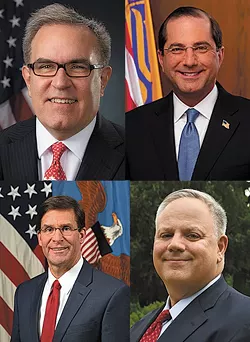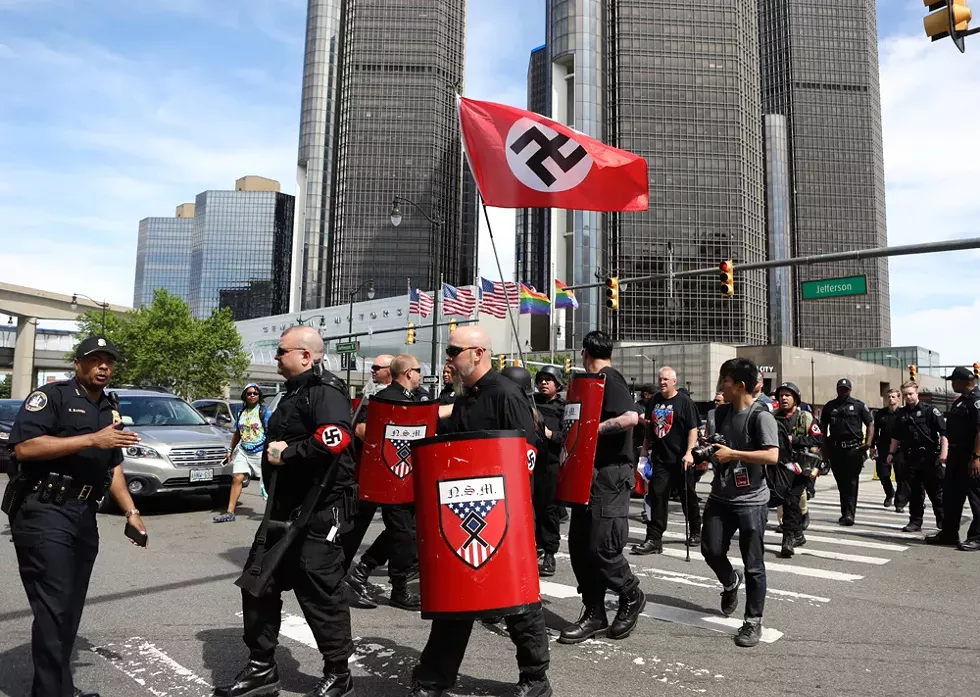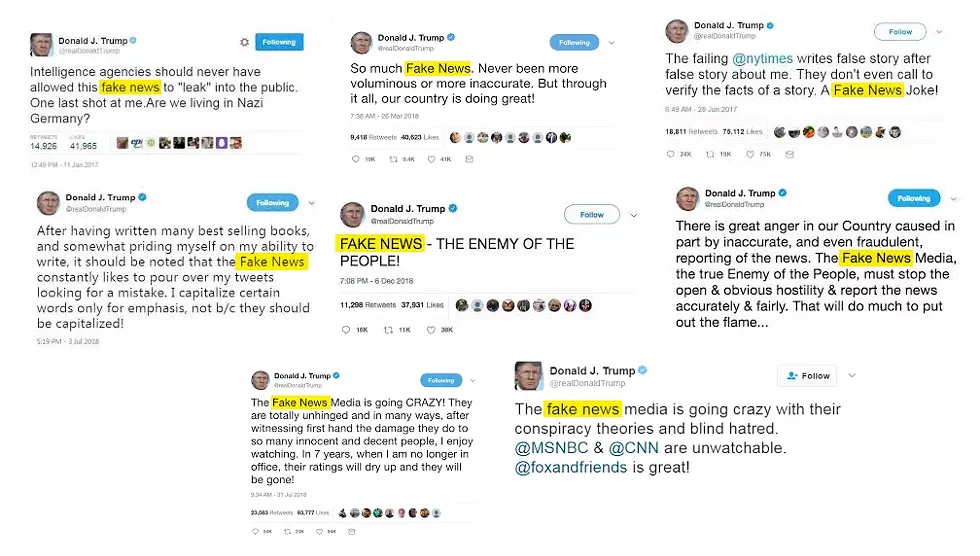In recent months, the word "fascist" has been thrown at everything from Alexandria Ocasio-Cortez's Green New Deal and statements made by Democratic House Speaker Nancy Pelosi to Disney's remake of The Lion King.
But's there's one target of the F-word that stands out above all others — President Donald Trump. At no time in America's history has the word been so openly and repeatedly applied to the person sitting in the Oval Office. There is much this president has done that generates legitimate concern: His cruel, dehumanizing treatment of refugees seeking asylum. The crass and vulgar attitudes toward women. Attempts to limit minority communities' access to the polls. Efforts to erode LGBTQ protections.
All of this and more is reprehensible in the eyes of many people.
Even so, does that justify calling the president a fascist, or are his critics guilty of carelessly setting off rhetorical dynamite, further inflaming passions on either side of the already volatile Trump divide?
Answering that timely question requires a close look at both the word and the man.
Fascism's roots
Fascism first emerged in the 1920s under Italian dictator Benito Mussolini, followed by Germany's Adolf Hitler. It is generally characterized as a form of authoritarianism with distinct attributes that distinguish it from other types of despotic rule.
Finding an agreed-upon definition, though, is a slippery task.
President Franklin D. Roosevelt, who led America in its fight to defeat fascism in World War II, described it this way: "The first truth is that the liberty of a democracy is not safe if the people tolerate the growth of private power to a point where it becomes stronger than their democratic state itself. That, in its essence, is fascism — ownership of government by an individual, by a group, or by any other controlling private power."
In that regard, Trump has clearly turned the keys of governance over to the private sector. A former oil industry lobbyist is the acting Secretary of the Interior, the Defense Department is headed by a former Boeing executive, a former pharmaceutical industry lobbyist leads the Department of Health and Human Services, and a former coal lobbyist runs the Environmental Protection Agency. But those are just a few of the most high-profile examples. An investigation last year by the nonprofit journalist group ProPublica found that "at least 187 Trump political appointees have been federal lobbyists, and despite President Trump's campaign pledge to 'drain the swamp,' many are now overseeing the industries they once lobbied on behalf of."
That's not a new phenomenon, however. George W. Bush's administration, in particular, was noted for appointing industry representatives as regulators.
A more expansive definition of fascism than the one provided by Roosevelt can be found in the work of John McNeill, a professor of history at Georgetown University. In an October 2016 op-ed published in the Washington Post, McNeill described 11 core attributes of fascism, which he said has both social and political elements.

Writing before Trump ascended to the presidency, McNeill created a rating system of zero to four "Benitos" — in recognition of Mussolini — for each of those 11 markers.
Most of McNeill's fascist fundamentals are self-explanatory: hyper-nationalism, militarism, fetishization of youth, fetishization of masculinity, leader cult, glorification of violence and readiness to use it in politics, lost-golden-age syndrome, hierarchical party structure and tendency to purge the disloyal, and theatricality.
Two other aspects of fascism identified by McNeill are less intuitive.
First, there's what McNeill called "mass mobilization and mass party." The professor pointed out that both "Mussolini and Hitler rode to power on tidal waves of support that were organized into new political parties. Trump didn't create a new party. Instead he has made a venerable one, the Grand Old Party, into his vehicle."
As for "self-definition by opposition," McNeill means the propensity of fascists to define themselves as "the bulwark against various evils and menaces to the nation. Those included communism, routine democratic politics, the traditional conservatism of industrial and agrarian elites ... and, especially in the German case, foreigners and minorities."
Trump, by McNeill's judgement, earned 26 Benitos out of a possible 44. That translates to a grade of 60 percent — an unnervingly high number to be pinned on the occupant of the Oval Office.
McNeill, however, stopped short of labeling Trump a full-fledged fascist:
"Projecting an air of menace at rallies, uttering ambiguous calls for assassinations, tacitly endorsing the roughing-up of protesters, urging the killing of terrorists' families and whatever else Trump does — while shocking by the standards of American politics — fall far short of the genuinely murderous violence endorsed and unleashed by authentic fascists."
From words to actions
Any reasonable evaluation of Trump's rhetoric and actions since taking office can only conclude that the dial on McNeill's fascist meter has continued to move higher since his op-ed appeared nearly three years ago. McNeill says via email that he would give Trump a slightly higher score based on his actions since taking office.
He's also sounding a new warning. "A major test will come if he loses the 2020 election," he says. "Will he denounce its legitimacy and urge his loyalists not to respect the outcome? I consider that a real possibility because he seems to care so much more about himself and his image than about society at large or the traditions, institutions, and culture of democracy." History shows authoritarians don't leave office easily, especially if criminal indictments are likely once they are out of power.

Following his election, the ugly anti-immigrant rhetoric of candidate Trump, who repeatedly described Mexican immigrants as drug dealers, murderers, and rapists, quickly transformed into an equally ugly agenda once he took office.
"The Trump administration continues to make changes both small and drastic to U.S. immigration policies ... that support a white nationalist agenda," according to a report posted on the website of the American Friends Service Committee, a Quaker-run nonprofit. "By keeping more people out, deporting people who are here, and creating an atmosphere of nativism and fear that affects everybody, Trump is attempting to dramatically reduce immigration to the United States, particularly of people of color."
Be it his multiple executive orders aimed at stopping immigration from Muslim-majority countries and the immense cruelty of separating children from parents seeking asylum, or the massive roundups by ICE agents in recent weeks, Trump is clearly using what McNeill called "self-definition by opposition" to continue motivating his base as he seeks re-election.
It's not just immigrants feeling the wrath generated by Trump. In effect, he's consistently sticking with a tactic that's so far worked to his advantage: exploiting the fears and bigotry of a base that is overwhelmingly white and solidly evangelical. He will occasionally give lip service to calls for unity, but his record has long told a different story.
The dehumanizing of those deemed "others" is among the most chilling of fascism's tenets. In this, President Trump excels.
Even USA Today, a bastion of mainstream journalism, shined a light on the president's racism: "Trump has created controversy for years with incendiary rhetoric that is often directed at people of color — from his branding of the Central Park Five as 'muggers and murderers' to his peddling of the false 'birther' conspiracy against then-President Barack Obama to his denigrating of a former African-American aide as a 'dog' to his attacks against four Democratic congresswomen of color."
The dehumanizing of those deemed ‘others’ is among the most chilling of fascism’s tenets. In this, President Trump excels.
tweet this
The paper chronicled more than a dozen such instances of divisiveness.
It's more than just abusive rhetoric. As CNN reported, "Since Donald Trump's inauguration, the Department of Justice has reversed or retreated from prior positions in at least three significant voting rights matters, including two in which it abandoned claims of intentional discrimination.
"The DOJ's reversal of positions signals to lawmakers that there is a degree of tolerance for voting discrimination. It runs the risk of being perceived as a wink-of-the-eye to those who would push the limits of discriminatory tactics, and a cold shoulder to those vulnerable populations who have counted on the federal government to have their backs."
The extent to which Trump is seen as a threat to African Americans is reflected in the NAACP's unanimously approved resolution supporting the president's impeachment. Taking such a drastic position is unusual for the nation's oldest civil rights organization.
"The group has been sharply critical of policies it disagrees with, such as President George W. Bush's handling of Hurricane Katrina and decision to go to war in Iraq," the Washington Post reported, "but outside observers note that the vote to support Trump's impeachment is a significant step for a group typically inclined to work with elected officials."
When it comes to the LGBTQ community, Trump's rhetoric has generally lacked the vitriol spat at other marginalized groups. His administration's actions, though, are dangerously regressive. Two cases going to the U.S. Supreme Court starkly illustrate Team Trump's real stance regarding LGBTQ rights. One case (two lower-court cases that have been combined) centers on gay and lesbian employment protections. The other involves a person fired after coming out as a trans woman at the metro Detroit funeral home she worked at for years. In both cases, Trump's Department of Justice has weighed in on the side of the employers, arguing that civil rights laws prohibiting sex discrimination do not cover LGBTQ people. The administration has also put forward proposals and administrative rules that would permit discrimination against LGBTQ in the name of "religious freedom."
"His administration has steadily worked to expand protections for religious groups, while scaling back protections for LGBTQ people, women seeking abortions, and others," The Atlantic magazine reported in August. "The Department of Health and Human Services has led this charge, but across the administration, the mission is clear: Obama's legacy on discrimination needs to be reversed."
Along with creating real hardships, Trump's stoking of intolerance toward minorities and political opponents is, based on a growing body of evidence, also inspiring horrific violence. The fomenting of violence is, as McNeill and others have pointed out, is a fundamental aspect of fascism.
As Time magazine reported: "Mussolini and those who came after him had very specific ideas about who got to be part of the nation. It followed that those who did not fit the mold were seen as disruptive to that unity, and thus subject to violence."
Sound familiar? It should.
At a Florida campaign rally in May, a Trump supporter enthusiastically shouted "shoot them" when the president asked how we should stop immigrants from crossing the border. The Hill reported that, instead of soundly condemning the threat of violence, a "seemingly pleased" Trump "smirked" and then quipped, "That's only in the Panhandle you can get away with that statement."
Trump's stoking of intolerance and bigotry is clearly having an effect.
A recent investigation by ABC News found 29 criminal cases nationwide where the perpetrators echoed "presidential rhetoric."
"These included 10 cases where the perpetrators either cheered or defended Trump while taunting or threatening others," the network reported. "On another 10 occasions, defendants justified their violent or threatening behavior in court by citing the president and his rhetoric. In nine other cases, Trump was hailed by perpetrators either during or after physically attacking innocent victims."
Along those same lines, the Brookings Institution, a nonprofit public policy organization based in Washington, D.C., reports that "FBI data show that since Trump's election there has been an anomalous spike in hate crimes concentrated in counties where Trump won by larger margins. It was the second-largest uptick in hate crimes in the 25 years for which data are available, second only to the spike after September 11, 2001."
In that same dispatch, Brookings also pointed to an Anti-Defamation League study showing that "counties that hosted a Trump campaign rally in 2016 saw hate crime rates more than double compared to similar counties that did not host a rally."
"While some observers have explained Trump's success as a result of economic anxiety, the data demonstrate that anti-immigrant sentiment, racism, and sexism are much more strongly related to support for Trump," according to Brookings.

Former national security adviser Susan Rice, a Black woman, told CNN that Trump "continues to divide us, most profoundly along racial lines. And to suggest those who come to this country as immigrants, those who have skin that looks like mine are somehow less than human. He has likened us to an invasion, an infestation. He uses terms that liken us to rodents."
It is a tactic pulled directly from the fascist playbook. There's a reason Hitler referred to Jews as "vermin": it is much easier to commit (and support) acts of violence against people stripped of their humanity.
All this dovetails with how Geoffrey Cain, a foreign correspondent and author, described fascism in a recent article for The New Republic:
"At its heart, fascism is an alliance of hardline and moderate conservatives seeking to repress left-wing sentiment. It's a campaign to convert the working classes to nationalism, to make them angry and violent, to convince them that they've been betrayed by their global-elite leaders. It's the resurrection of an illustrious past, an effort to propel the nation forward, to expand with industry, military weapons and technology."
The attacking of "others," a fostering of an "Us vs. Them" mentality, is intrinsic to fascism. In Hitler's Germany, it was glorification of what the Fuhrer called the "master race." In today's America, it is "white nationalism."
Jason Stanley, a Yale professor of political philosophy and author of the widely acclaimed book How Fascism Works: The Politics of Us and Them, was asked if it's possible to be a fascist without being racist.
He answered without hesitation: "Not on my definition of fascism."
Assaulting reality
There is one widely regarded aspect of fascism not contained in McNeill's list: A government built on lies.
"Rather than overthrow democracy in one full swipe, it has to be undermined through rigged elections, the creation of tribal identities, and legitimated through a propaganda machine so effective that it creates for its followers a universe of 'alternative facts' impervious to unwanted realities."
That's a view of fascism offered by columnist Fintan O'Toole in a piece for The Irish Times last year. He's far from being the first person to make the connection between state-sanctioned fabrication and authoritarian regimes. Political philosopher Hannah Arendt made a similar observation nearly 70 years ago in her landmark book The Origins of Totalitarianism:
"A totalitarian movement thrives on the denial and destruction of reality, offering alienated and rootless people a coherent and empowering counter-narrative, a false reality actualized through thoughtlessness, lies, disruption, dehumanization, lawlessness, propaganda, violence, terror, domination, and radical evil."
Journalist I.F. Stone once said that "all governments lie." It would be foolish to try to dispute that statement. What sets the Trump administration apart from its predecessors is the frequency and magnitude of its mendacity.
The sheer number of Trump's falsehoods and deceptive statements is staggering.
"President Trump's proclivity for spouting exaggerated numbers, unwarranted boasts and outright falsehoods has continued at a remarkable pace," the Washington Post reported. "As of Aug. 5, his 928th day in office, he had made 12,019 false or misleading claims, according to the Fact Checker's database that analyzes, categorizes and tracks every suspect statement the president has uttered.
"Trump crossed the 10,000 mark on April 26, and he has been averaging about 20 fishy claims a day since then. From the start of his presidency, he has averaged about 13 such claims a day."
More than just lying, what we're seeing in this administration is an assault on reality itself. From presidential adviser Kellyanne Conway's assertion that provably false claims regarding the crowd size at Trump's inauguration were merely "alternative facts," to Rudy Giuliani's assertion on Meet the Press that "Truth isn't truth," Trump and his crew have led the way to what journalist Dan Rather has described as a "post-truth political era in which there's no such thing as objective facts."
As Trump told those attending the Veterans of Foreign Wars National Convention last year: "Just remember: What you're seeing and what you're reading is not what's happening."
Integral to that effort are Trump's repeated claims that journalists are "enemies of the people" and the mainstream press is a propagator or "fake news" — a phrase chillingly similar to one employed by Hitler to discredit critics.
"When a video of two Donald Trump supporters shouting 'Lügenpresse' (lying press) started to circulate Sunday, viewers from Germany soon noted its explosive nature," the Washington Post reported in 2016. "The defamatory word was most frequently used in Nazi Germany. Today, it is a common slogan among those branded as representing the 'ugly Germany': members of xenophobic, right-wing groups."
Following Trump's lead, authoritarian strongmen around the globe have adopted the term "fake news" as a way of deflecting critical reporting.
"The phrase 'fake news' — granted legitimacy by an American president — is being used by autocrats to silence reporters, undermine political opponents, stave off media scrutiny and mislead citizens," the late-Sen. John McCain wrote in the Washington Post in 2017.

As with the increase of violence against minorities in this country, hateful rhetoric can foster dire consequences. A December 2018 report from the group Reporters Without Borders reveals just how dire.
"A total of 80 journalists were killed this year, 348 are currently in prison, and 60 are being held hostage," according to the annual roundup of deadly violence and abusive treatment of journalists worldwide.
"Violence against journalists has reached unprecedented levels this year, and the situation is now critical," said Christophe Deloire, the press freedom group's Secretary-General. "The hatred of journalists that is voiced, and sometimes very openly proclaimed, by unscrupulous politicians, religious leaders and businessmen has tragic consequences on the ground, and has been reflected in this disturbing increase in violations against journalists.
"Amplified by social networks, which bear heavy responsibility in this regard, these expressions of hatred legitimize violence, thereby undermining journalism, and democracy itself, a bit more every day."
Testing the waters
The problem with labeling anyone a fascist these days is that, as George Orwell alluded to more than 70 years ago, it is seemingly impossible to arrive at a definition of the word that is universally agreed to.
As deeply troubling as he is, Donald Trump is not Adolf Hitler.
On the other hand, just as a person can be judged by the company they keep, it is fair to evaluate a politician by looking at who supports them. And in the case of Trump, self-declared neo-Nazis and white supremacists have clearly embraced him as their champion. In 2016, Trump received ringing endorsements from The Daily Stormer, a neo-Nazi blog, and former Ku Klux Klan grand wizard David Duke.
In February, the Southern Poverty Law Center reported a shocking rise in the number of hate groups it tracks. It blamed the president.
"The number of hate groups operating across America rose to a record high — 1,020 — in 2018 as President Trump continued to fan the flames of white resentment over immigration and the country's changing demographics," the group reported.
Irish journalist Fintan O'Toole summed up the current situation regarding Trump and a growing number of authoritarian rulers around the world this way:
"To grasp what is going on in the world right now, we need to reflect on two things," wrote O'Toole. "One is that we are in a phase of trial runs. The other is that what is being trialed is fascism — a word that should be used carefully but not shirked when it is so clearly on the horizon. .... Fascism doesn't arise suddenly in an existing democracy. It is not easy to get people to give up their ideas of freedom and civility. You have to do trial runs that, if they are done well, serve two purposes. They get people used to something they may initially recoil from, and they allow you to refine and calibrate. This is what is happening now, and we would be fools not to see it."
In May, after interviewing Yale philosophy professor Jason Stanley for his "Deconstructed" podcast, journalist Mehdi Hasan came to a trenchant conclusion of his own regarding Trump and fascism:
"You don't have to believe he's a literal reincarnation of fascist dictators to recognize that he is taking us down a very dark, ultra-authoritarian and violent path," he said. "Some of you may not want to call it fascism, but whatever you call it, make sure you stand up against it. As 2020 approaches, it's only going to get worse."
Curt Guyette is editor at large for the ACLU of Michigan.
Stay on top of Detroit news and views. Sign up for our weekly issue newsletter delivered each Wednesday.







